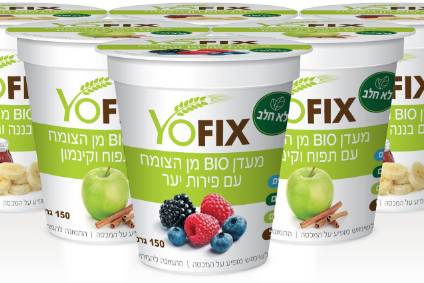The backing for Israeli dairy-free start-up Yofix Investments by two major European dairy companies shows a key macro trend could become a competitive flank in dairy alternatives, writes Dean Best.
The rising importance of the ‘clean label’ trend in dairy-free products – the use of more natural, more familiar, simpler ingredients – has been underscored by the investments by two of Europe’s largest dairy companies in the same start-up.
Yogurt major Müller and cheese giant Bel have both invested in Yofix Probiotics, the Israel-based, dairy-free yogurt start-up offering clean-label alternatives to dairy.
Yofix, which attracted seed investment in 2015 and more backing two years later from investors including Israeli food company Strauss Group, manufactures fermented, plant-based prebiotic and probiotics foods that are soy-free.
As well as Strauss, Yofix has already caught the eye of PepsiCo, winning an incubator programme hosted by the US giant in Europe. PepsiCo said at the time it was “impressed” by Yofix’s “strategic launch and significant retail growth during the programme”.
Consumer demand for dairy-free foods is unquestionably on the rise in a number of markets. The numbers of vegetarians and vegans is increasing but still remain small as a proportion of total populations. As with meat-free, the dairy-free markets are being driven, in the main, by still dairy-eating, ‘flexitarian’ consumers looking for alternatives for reasons of health. In many ways, plant-based has – in the minds of the vast majority of consumers – become almost synonymous with ‘healthy’.

US Tariffs are shifting - will you react or anticipate?
Don’t let policy changes catch you off guard. Stay proactive with real-time data and expert analysis.
By GlobalDataSo far, so good for dairy-free companies and for the conventional dairy groups now operating in the category either through innovation or M&A.
However, as demand grows, so is the attention shoppers are paying to the ingredients used in dairy-free products.
And, as the category matures, that scrutiny will only intensify. Dairy-free companies offering ‘clean-label’ products – containing more natural, familiar and simple ingredients – stand to prosper.
Clean-label concerns most relevant to plant-based protein alternatives relate primarily to long ingredients lists, the use of novel or unfamiliar ingredients and criticism some products are “highly processed”.
Some consumers may, of course, still decide to purchase dairy alternatives even if they are not wholly satisfied with how some products are made, making trade-offs favouring, for example, animal welfare.
However, prioritising clean-label – without sacrificing taste and other sensory aspects, of course – will likely best position a plant-based company for the long haul.
And conventional dairy companies are not standing idly by. Dozens of mainstream dairy processors have already made strides in the dairy-free market through innovation or acquisition and yesterday two major European players underlined how they believe ‘clean label’ could soon be a new area of potential.
The investment from Müller and Bel will be used to help Yofix’s international ambitions. Yofix’s two new investors will be looking to learn more about how the Israel firm develops its clean-label offerings.





